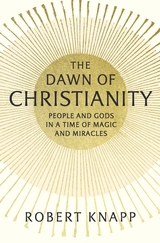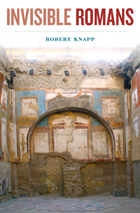
Ordinary people of antiquity interacted with the supernatural through a mosaic of beliefs and rituals. Exploring everyday life from 200 BCE to the end of the first century CE, Robert Knapp shows that Jews and polytheists lived with the gods in very similar ways. Traditional interactions provided stability even in times of crisis, while changing a relationship risked catastrophe for the individual, his family, and his community. However, people in both traditions did at times leave behind their long-honored rites to try something new. The Dawn of Christianity reveals why some people in Judea and then in the Roman and Greek worlds embraced a new approach to the forces and powers in their daily lives.
Knapp traces the emergence of Christianity from its stirrings in the eastern Mediterranean, where Jewish monotheism coexisted with polytheism and prayer mixed with magic. In a time receptive to prophetic messages and supernatural interventions, Jesus of Nazareth convinced people to change their beliefs by showing, through miracles, his direct connection to god-like power. The miracle of the Resurrection solidified Jesus’s supernatural credentials. After his death, followers continued to use miracles and magic to spread Jesus’s message of reward for the righteous in this life and immortality in the next.
Many Jews and polytheists strongly opposed the budding movement but despite major setbacks Christianity proved resilient and adaptable. It survived long enough to be saved by a second miracle, the conversion of Emperor Constantine. Hand in hand with empire, Christianity began its long march through history.

What survives from the Roman Empire is largely the words and lives of the rich and powerful: emperors, philosophers, senators. Yet the privilege and decadence often associated with the Roman elite was underpinned by the toils and tribulations of the common citizens. Here, the eminent historian Robert Knapp brings those invisible inhabitants of Rome and its vast empire to light.
He seeks out the ordinary folk—laboring men, housewives, prostitutes, freedmen, slaves, soldiers, and gladiators—who formed the backbone of the ancient Roman world, and the outlaws and pirates who lay beyond it. He finds their traces in the nooks and crannies of the histories, treatises, plays, and poetry created by the elite. Everyday people come alive through original sources as varied as graffiti, incantations, magical texts, proverbs, fables, astrological writings, and even the New Testament.
Knapp offers a glimpse into a world far removed from our own, but one that resonates through history. Invisible Romans allows us to see how Romans sought on a daily basis to survive and thrive under the afflictions of disease, war, and violence, and to control their fates before powers that variously oppressed and ignored them.
READERS
Browse our collection.
PUBLISHERS
See BiblioVault's publisher services.
STUDENT SERVICES
Files for college accessibility offices.
UChicago Accessibility Resources
home | accessibility | search | about | contact us
BiblioVault ® 2001 - 2024
The University of Chicago Press









